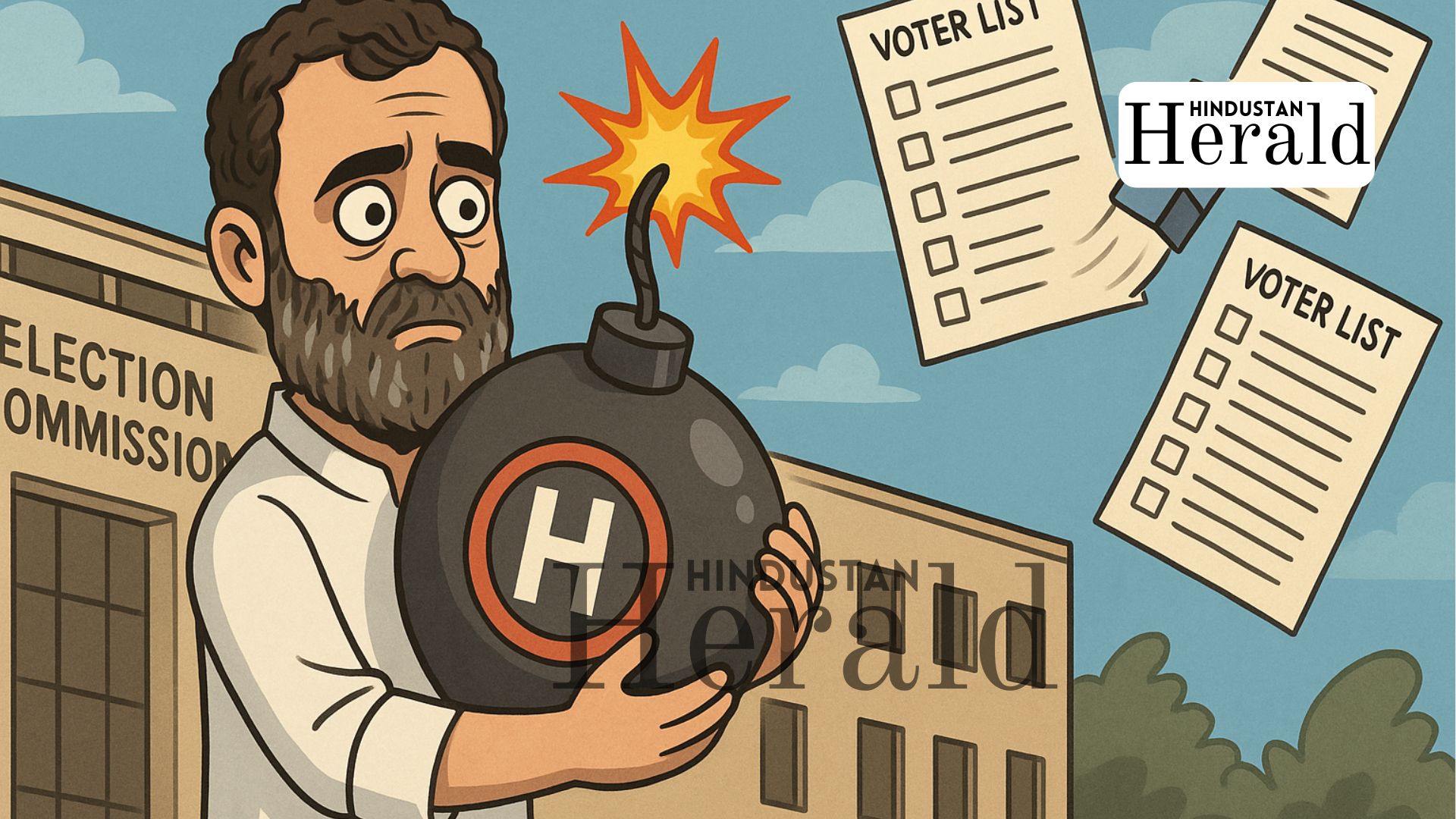New Delhi, September 18: Rahul Gandhi has picked his fight carefully this week, and he isn’t letting go. In a fiery press briefing in the capital, the Congress leader accused the Election Commission of India of nothing short of complicity in what he described as “vote chori,” the mass deletion of names from electoral rolls in several states. He didn’t stop at vague claims. He cited numbers, pointed fingers, and demanded answers directly from the Chief Election Commissioner, Gyanesh Kumar, whom he branded as the protector of “vote thieves.”
The warning was blunt: give an explanation within a week, or he will drop what he dramatically called a “hydrogen bomb” of proof.
A Charge That Cuts to the Core of Democracy
At the center of Gandhi’s allegations is a constituency most Indians wouldn’t otherwise be talking about, Aland in Karnataka. According to Gandhi, over 6,000 names disappeared from the voter list there. And Aland, he stressed, was just an example. Similar deletions, he said, are happening in Maharashtra, Haryana, Uttar Pradesh, and beyond.
The claim itself isn’t new. Opposition parties have for years complained of voter list irregularities. What is different here is the scale and the method Gandhi describes. He argues these are not clerical mistakes by local officials but centrally orchestrated deletions, carried out through software manipulation. Voter IDs were reportedly linked to mobile numbers and OTPs that didn’t even belong in the same state.
“This is not democracy, this is theft,” Gandhi told reporters, his words sharp and deliberate. “And the Commission, instead of stopping it, is protecting the thieves.”
Whispers From Inside the Commission
Perhaps the most provocative part of Gandhi’s press conference was his insistence that he is receiving information directly from inside the Election Commission.
That sort of claim lands heavily in Delhi’s political circles. If true, it would point to dissent within the institution charged with safeguarding the electoral process. If false or exaggerated, it risks undermining public trust in the very idea of a neutral referee in Indian politics.
The Election Commission, for now, has chosen silence. No rebuttal. No statement. Just a heavy pause as the Congress sharpens its lines of attack.
The Drama of the “Hydrogen Bomb”
The phrase has already done its job. By threatening to release a “hydrogen bomb” of evidence, Gandhi has turned what could have been just another allegation into a story that refuses to die on its own.
Congress insiders suggest the party does have documentation of voter deletions in multiple constituencies. Whether that paperwork adds up to the explosive metaphor Gandhi used is a different matter. But the tactic is clear: raise the stakes so high that the Election Commission cannot simply shrug off the charge.
The risk, of course, is obvious. If the promised bomb turns out to be a firecracker, Gandhi will face ridicule for overplaying his hand.
Trouble in Amritsar
Even as Gandhi hammered away at the Election Commission, he was caught in an unexpected controversy in Punjab. His visit to Gurdwara Baba Budha Sahib in Amritsar led to disciplinary action against local staff of the Shiromani Gurdwara Parbandhak Committee (SGPC).
The reason: employees presented him with a siropa, a robe of honour reserved for those who enter the gurdwara under the correct religious code. The SGPC says Gandhi entered a restricted area without the required attire, making the honour inappropriate under Sikh maryada (religious discipline).
The employees who facilitated it have been punished. The SGPC insists this wasn’t about politics but about preserving protocol. Still, in Punjab, where religion and politics are often inseparable, the episode has stirred its own ripples.
Why It Matters
Taken together, the two stories show both the reach and the vulnerability of Rahul Gandhi’s politics right now. In Delhi, he is casting himself as the lone challenger willing to call out what he sees as institutional decay. In Amritsar, he is reminded that even symbolic gestures can backfire in sensitive religious contexts.
The larger question, though, is about the Election Commission. Allegations of 6,000 missing voters in one constituency may not sound massive in a country with nearly a billion voters, but if the charge of a systemic, software-driven purge sticks, it could shake confidence in upcoming elections in ways no ruling party would welcome.
That’s why Gandhi’s week-long deadline to the Chief Election Commissioner matters. If the Commission issues a strong rebuttal backed by data, it could deflate the opposition’s charge. If it stays silent, the perception of wrongdoing may only deepen.
What Lies Ahead
The BJP is yet to launch a full-throated counterattack, but party leaders are expected to dismiss Gandhi’s rhetoric as another round of political theatre. The Congress, on the other hand, seems prepared to keep feeding the story until it gains traction.
For ordinary voters, the details of OTPs and databases may not be easy to follow. But the phrase “vote chori” is simple, sharp, and potent. That alone ensures this battle isn’t going away in a hurry.
Stay ahead with Hindustan Herald — bringing you trusted news, sharp analysis, and stories that matter across Politics, Business, Technology, Sports, Entertainment, Lifestyle, and more.
Connect with us on Facebook, Instagram, X (Twitter), LinkedIn, YouTube, and join our Telegram community @hindustanherald for real-time updates.
Covers Indian politics, governance, and policy developments with over a decade of experience in political reporting.






